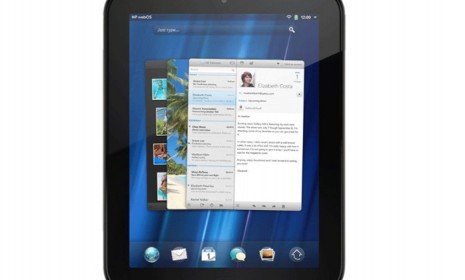H.P.'s 'dismal' TouchPad failure: 3 lessons
The tech giant's attempt to enter the tablet market was one of 2011's biggest gadget flops. How did it go so wrong?

A free daily email with the biggest news stories of the day – and the best features from TheWeek.com
You are now subscribed
Your newsletter sign-up was successful
Hewlett-Packard's TouchPad tablet was one of the year's most anticipated gadgets, a possible iPad killer and Android challenger. Instead, the upstart tablet, which ran on the webOS operating system that HP picked up when it acquired Palm (rather than Google's Android or Apple's iOS), was one of 2011's "biggest flops," braving the market for just seven weeks before it was pulled due to weak sales. Now, analysts and former HP employees are asking what lessons can be learned from the TouchPad's "dismal" story. Here are three:
1. The TouchPad was doomed from the start
"Palm was ahead of its time," but "the technology wasn't there yet," Paul Mercer, a former senior director of software at Palm who worked on WebOS, tells The New York Times. It was supposed to be a smartphone software platform that would rely on web-based apps, rather than native ones, like Android and Apple's iOS do. But, "we just weren't able to execute such an ambitious and breakthrough design." Other former employees say that Palm's chief executive at the time, Jon Rubinstein, didn't have much experience with software development and failed to grasp the challenges of creating an entirely new operating system.
The Week
Escape your echo chamber. Get the facts behind the news, plus analysis from multiple perspectives.

Sign up for The Week's Free Newsletters
From our morning news briefing to a weekly Good News Newsletter, get the best of The Week delivered directly to your inbox.
From our morning news briefing to a weekly Good News Newsletter, get the best of The Week delivered directly to your inbox.
2. It's really, really difficult to compete with Apple and Google
"The WebOS story also illustrates how hard it will be for anyone to mount a serious challenge to Apple and Google when it comes to mobile operating systems," says Brian X. Chen in The New York Times. The two giants already dominate the market and have legions of developers making apps for their operating systems. It's exceedingly hard for others to grain traction. Yeah, it's a "scary" lesson, says Eric Seman at InformationWeek. "Palm was an established player in the smartphone market" and it was acquired by HP — a tech giant with plenty of resources. Still, the TouchPad wasn't able to compete.
3. Especially with an inadequate investment of time and money
I don't buy the excuse that "the technology wasn't there yet," says John Biggs at TechCrunch. Other operating systems, including WinPho7, manage to perform the basic functionality that webOS was supposed to be deliver. The real lesson is "that Palm [and in turn HP] tried to play by start-up rules in an established game." WebOS was developed in just nine months. That might be enough time to program "a social network for goat lovers," but developing a mass-market smartphone operating system is considerably more taxing.
A free daily email with the biggest news stories of the day – and the best features from TheWeek.com
-
 Switzerland could vote to cap its population
Switzerland could vote to cap its populationUnder the Radar Swiss People’s Party proposes referendum on radical anti-immigration measure to limit residents to 10 million
-
 Political cartoons for February 15
Political cartoons for February 15Cartoons Sunday's political cartoons include political ventriloquism, Europe in the middle, and more
-
 The broken water companies failing England and Wales
The broken water companies failing England and WalesExplainer With rising bills, deteriorating river health and a lack of investment, regulators face an uphill battle to stabilise the industry